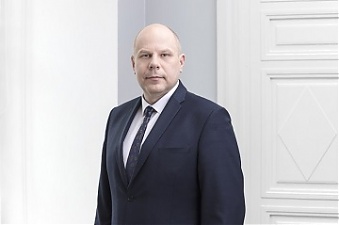Estonia, Innovations, Internet, Technology
International Internet Magazine. Baltic States news & analytics
Monday, 05.01.2026, 10:08
Estonian IT minister: 5G network necessary already in near future
 Print version
Print version |
|---|
Siem met with executives of telecommunications companies in the framework of public consultations over a regulation to change the terms of the first tender for 5G frequencies to get an overview of the state of play in the discussions.
"Foremost I wanted to get an overview of what ideas, proposals, but also controversies communications operators are having at the moment when it comes to the frequency tender," Siem said.
According to the minister, all the executives said that the demands of our consumers and the data volumes handled are growing day by day, especially in light of remote working having become commonplace now.
The minister said that he is optimistic, even though the issue of distribution of frequency permits has been pending for longer than expected and caused differences among the parties.
"Based on yesterday's meeting, I can see that cooperation is possible and I hope that we will soon reach an outcome thanks to which we will get the development of the 5G network in Estonia going in the future," the minister said.
In mid-June, the minister decided to extend the period of public consultation over the regulation to make changes to the tender for the first 5G frequency band of 3.6 GHz. Feedback from telecom operators is awaited by July 31 the latest.
According to the minister's proposal, the 3,410-3,800 megahertz band will be divided into four equal bands instead of three as a measure to facilitate competition.
- 26.08.2021 LLC Dizozols Investments finalizes investment attraction deal with Crowdestor with record-high profits
- 30.12.2020 Накануне 25-летия Балтийский курс/The Baltic Course уходит с рынка деловых СМИ
- 30.12.2020 On the verge of its 25th anniversary, The Baltic Course leaves business media market
- 29.12.2020 Number of new companies registered in Estonia up in 2020
- 28.12.2020 Рынок недвижимости Эстонии осенью начал быстро восстанавливаться
- 28.12.2020 Tartu to support students' solar car project
- 28.12.2020 Owner of Kunda Nordic Tsement to install full-scale CCS facility in Norway
- 23.12.2020 В 2019 году выросли прибыль и оборот Eesti Pagar
- 23.12.2020 В Литве учреждены еще две белорусских компании
- 23.12.2020 Flying Forward 2020 starts developing air mobility of cities








 «The Baltic Course» Is Sold and Stays in Business!
«The Baltic Course» Is Sold and Stays in Business!

